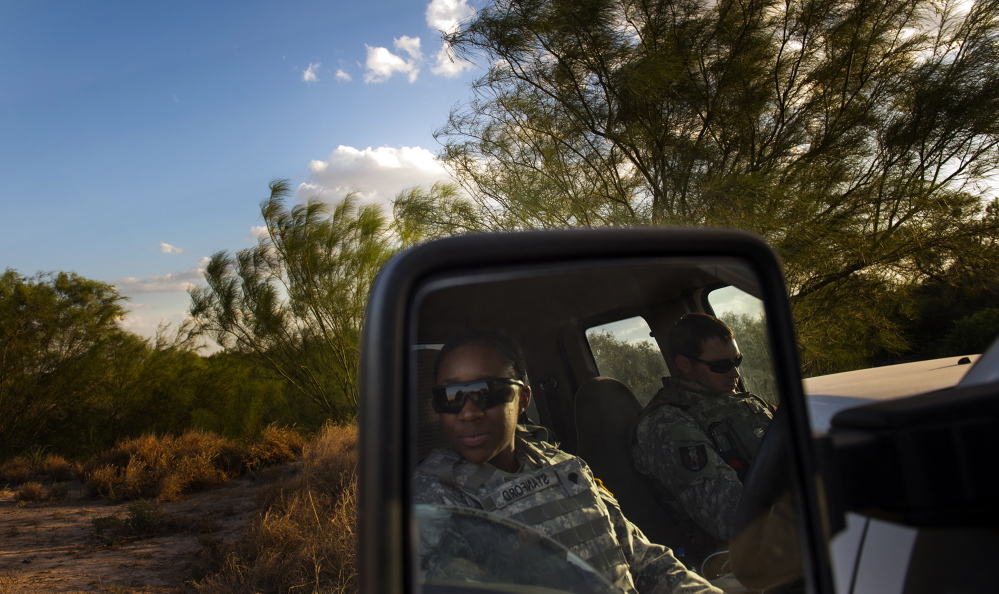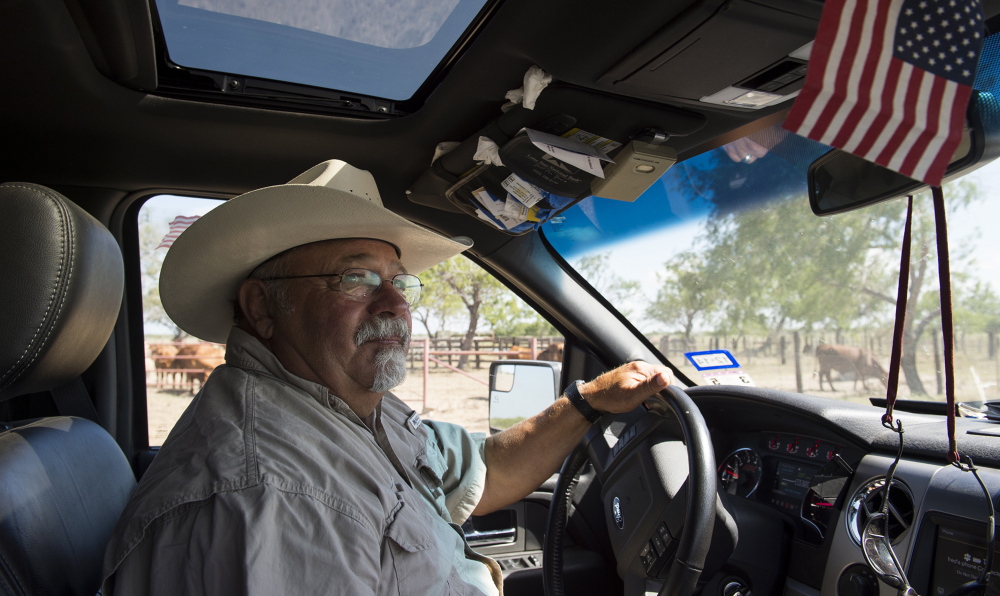RIO GRANDE CITY, Texas —The National Guard troops arrived here last week, outfitted in body armor and carrying pistols to help bring more security to the U.S.-Mexico border.
Yet they saw little activity after taking their positions in portable towers and Border Patrol vehicles along the dirt roads and levees that overlooked the dense brush near the Rio Grande.
Some found themselves fighting boredom, chatting with one another about their lives back home – where their jobs are altogether different than looking out for armed traffickers – and wondering how much longer they would be posted in the unforgiving desert heat. Others killed time any way they could during taxing 12-hour shifts watching the silent riverbank.
“The music keeps me up,” said one soldier listening to old-school R&B tunes who requested anonymity because, as several guardsmen explained, the soldiers were not permitted to speak to the media. “We’re keeping our eyes on the brush.”
PERRY STRIKES A TOUGH TONE
The National Guard was dispatched to the border with great fanfare by Texas Gov. Rick Perry, R, who declared in July that he was forced to act because of a string of failures by the federal government in addressing drug smugglers and an influx of unaccompanied Central American minors who had flooded across the border in recent months.
As of last week, 400 guardsmen had arrived. A total of 1,000 are expected to gather in the coming weeks, concentrated in this stretch of border on Texas’s southernmost tip, running through the Rio Grande Valley from Brownsville to McAllen. This region has been seen as especially vulnerable to illegal crossings.
The rollout of the troops has offered Perry a chance to strike a tough tone on illegal immigration as he ponders a run for president in 2016 – and seeks to undo the political damage from a failed 2012 run in which conservatives attacked him as soft on the issue.
In his previous run, Perry told rivals opposed to giving illegal-immigrant children in-state college tuition that “I don’t think you have a heart.” Now, as he presides over his state’s National Guard deployment and blasts President Barack Obama’s record on border security, Perry is positioning himself as a border hawk with views closely aligned with the core Republican voters who will play a big role in choosing the party’s 2016 White House nominee.
But now that the guardsmen have arrived, their exact role, besides keeping watch on the brush, is not entirely clear.
The soldiers have undergone training in recent weeks in air and ground surveillance. During their shifts, they stand watch, usually from stations peering out over the river, or while joining Border Patrol units driving around the dusty expanses outside McAllen.
In their off hours they take in their new surroundings from the gangways of hotels with cigarettes or cold beers in hand.
Meanwhile, the number of border crossers has been on the decline in recent weeks, with the flow of unaccompanied minors slowing considerably.
The presence of additional soldiers is being greeted here with mixed emotions, with some locals appreciating the added protection and others wondering when enough is enough.
‘A POLICE STATE NOW’
The charm of living near cattle ranches and mesquite trees that make up large portions of the Rio Grande Valley is steadily evaporating, residents say.
“It’s all different. I think the United States is a police state now,” said Javier Pena, a former police officer in Rio Grande City who had just finished breakfast at the Texas Cafe.
Others see the National Guard troops as necessary.
“Will the border ever be secure? The answer is that it could be. But the federal government needs to get off the side, get in the game and be a real player and stop pretending,” said Rio Grande City Mayor Ruben Villarreal, whose community has seen the brunt of border crossing and drug smuggling.
“When these women and children were crossing our border, it opened all of our eyes up,” Villarreal said. “They’re the more delicate, the more fragile in our society, and they were walking across our border like they were just going through turnstiles at a baseball game.”
Officials from the Perry administration and the National Guard declined to be interviewed to discuss the soldiers’ role.
Tom Vinger, a spokesman for the Texas Department of Public Safety, which is overseeing the governor’s border efforts, said the goal was to “deny Mexican cartels and their associates unfettered entry into Texas between the ports of entry, as well as reduce the power of these organizations, whose success depends on their ability to operate on both sides of the border.”
A statement from the agency that oversees the state’s National Guard, Texas Military Forces, said the soldiers were “amplifying the visible presence on the ground and along the river” in an effort to keep the Rio Grande Valley secure.
“Specifically, the Texas National Guard is providing a variety of subject matter experts and equipment primarily involving aviation assets, logistics and ground troops to support the state-led operations along the Texas-Mexico border,” the agency said.
SILENCE IS BROKEN
The arrival of the Central American children and the National Guard deployment have shaken some local residents who have lived for decades with illegal crossings and smuggling over the shimmering Rio Grande.
Back when the flow of people across the river was sporadic and smuggling meant someone’s neighbor moved tequila or flour back and forth across the border, it was easy to look the other way and go about your life, local residents say.
Now, the situation is far more complicated, with even the former Hidalgo County sheriff serving a five-year prison sentence after pleading guilty to money laundering and accepting campaign donations from an alleged drug trafficker.
Hidalgo County ranchers Fred and Josie Cappadona said they are eager to see more law enforcement near their cattle ranch.
The couple moved to the area during the early 1970s, shortly after Fred Cappadona, 68, returned from the Vietnam War, where he flew an assault helicopter on missions to the Cambodian border.
The silence of South Texas appealed to Cappadona, he said, a tranquility that was initially interrupted only occasionally by a random border crosser attempting to make his way north.
The degree of danger encroaching on their family recently burst into view during a birthday party the Cappadonas were holding for one of their grandchildren.
A truck traveling about 70 mph raced past a patio where the kids were playing, apparently lost as the driver sought to offload his human cargo. With his .380-caliber pistol within easy reach, Cappadona drove after the truck and asked the driver to slow down before the truck raced off through another fence, he said.
That and other encounters make the idea of living with more law enforcement in the area palatable, even if it means losing some of their tranquility, he said.
“Yeah, it’s not the same,” Cappadona said about his surroundings, which included herds of cattle with glistening coats meandering past what seemed like endless desert brush. “But we have to protect what we have to protect.”
Copy the Story LinkSend questions/comments to the editors.




Success. Please wait for the page to reload. If the page does not reload within 5 seconds, please refresh the page.
Enter your email and password to access comments.
Hi, to comment on stories you must . This profile is in addition to your subscription and website login.
Already have a commenting profile? .
Invalid username/password.
Please check your email to confirm and complete your registration.
Only subscribers are eligible to post comments. Please subscribe or login first for digital access. Here’s why.
Use the form below to reset your password. When you've submitted your account email, we will send an email with a reset code.